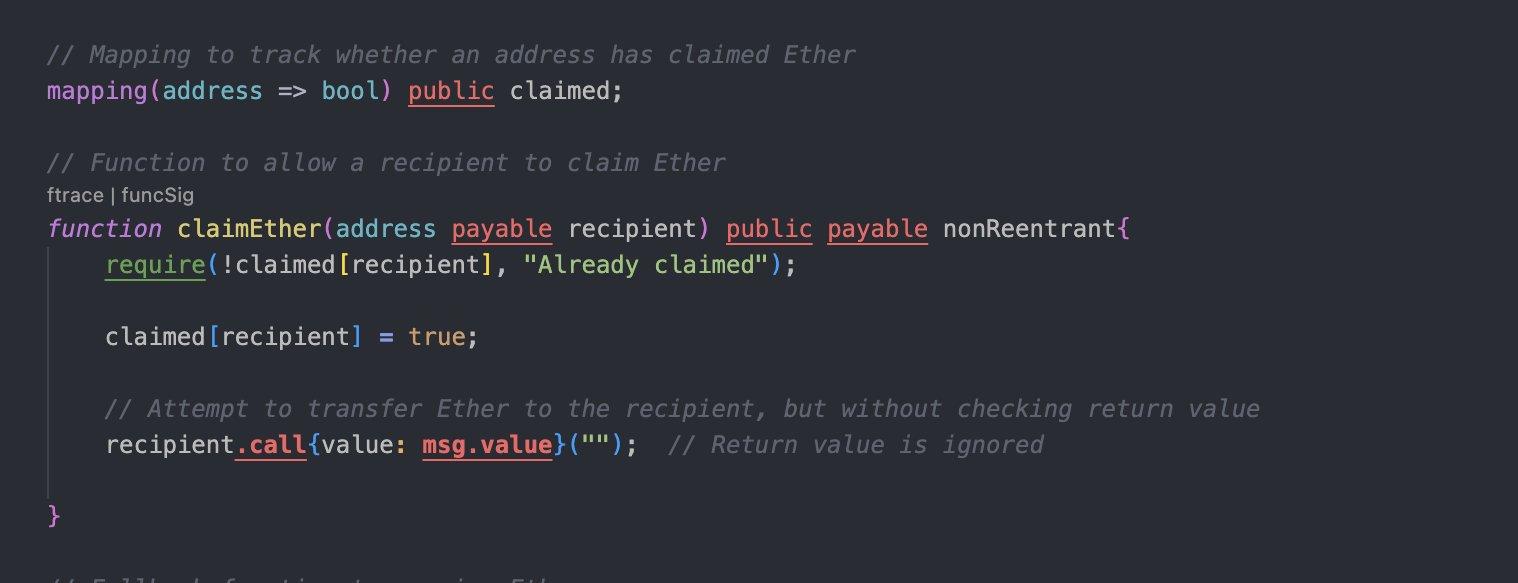In Solidity, functions like call(), delegatecall(), and staticcall() are classified as low-level calls. Unlike high-level Solidity functions, these low-level calls return a boolean value indicating whether the transaction succeeded or failed. However, they do not automatically revert the transaction upon failure. This gives developers more flexibility but also introduces potential risks if the return value isn't properly handled.
Unchecked Return Values in Low-Level Calls
One of the most common issues in smart contract development is failing to check the return value of a low-level call. Since these calls do not automatically revert when they fail, the lack of a proper check can result in silent failures. This can lead to incorrect assumptions about whether a critical operation, such as a transfer or function call, was successful.
Here’s an example of how this bug occurs. In this case, the contract uses call() to send Ether to a recipient, but it doesn’t check if the transfer was successful.
In this scenario, if the call fails (for instance, due to insufficient gas or if the recipient cannot accept Ether due to a missing fallback function), the contract will assume the transfer succeeded. This could lead to loss of funds or incorrect contract behavior.
Refund Scenario
Imagine a contract that handles refunds and stores the Ether balance in a way that refunds are allocated strictly. If someone triggers a permissionless refund function with insufficient gas, the call could fail silently. However, the contract’s state may still be updated to reflect that the refund occurred, even though no funds were actually transferred.
This unchecked return value bug could enable an attacker to exploit the contract by invoking such functions repeatedly, leading to a drain of available funds without actually performing the expected actions.
How to Effectively Handle Low-Level Calls
A few boxes can be checked to avoid vulnerabilities caused by unchecked return values. One, always check the return value of low-level calls (call(), delegatecall(), staticcall()). Two, use high-level function calls when possible, as they automatically handle errors. Lastly, implement proper error handling mechanisms, such as reverting the transaction if the low-level call fails.
Here's how the previous example can be fixed:

By requiring a successful transfer, the contract ensures that the operation doesn't proceed unless the funds are actually sent.
FAQs
1. What is a low-level call in Solidity?
Low-level calls like call(), delegatecall(), and staticcall() allow developers to interact with contracts or perform certain operations without using high-level Solidity functions. They return a boolean indicating success or failure but do not automatically revert if they fail.
2. Why are unchecked return values in low-level calls a vulnerability?
Unchecked return values can lead to silent failures, where a transaction appears to have succeeded, but no action was taken. This can result in loss of funds or other unintended outcomes.
3. How can I avoid vulnerabilities with low-level calls?
Always check the return value of low-level calls to ensure the operation is successful. Alternatively, use high-level function calls, which handle failures automatically.
4. Can this issue affect refund mechanisms in smart contracts?
Yes, if a refund function doesn’t check the return value of a low-level call, it may update the contract's state incorrectly, leading to potential exploitation where funds are marked as refunded but are never actually sent.










